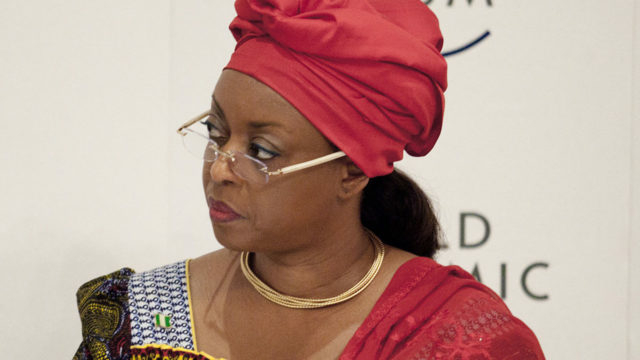-
A Federal High Court in Abuja granted Diezani Alison-Madueke’s request to amend her suit against the EFCC’s asset forfeiture order
-
Alison-Madueke claims she was denied a fair hearing before the EFCC’s confiscation of her assets, which she argues should be overturned
A Federal High Court in Abuja has taken a crucial step in the legal battle between former Petroleum Minister Diezani Alison-Madueke and the Economic and Financial Crimes Commission (EFCC).
On Monday, Justice Inyang Ekwo granted her request to amend her suit, challenging the EFCC’s final forfeiture order on her seized assets.
Alison-Madueke, at the centre of one of Nigeria’s biggest corruption cases, claims she was denied a fair hearing before the EFCC obtained court orders to permanently confiscate her assets.
Her legal team, led by Godwin Inyinbor, sought to amend her suit, a motion that EFCC’s lawyer, Divine Oguru, did not oppose. Justice Ekwo approved the amendment and granted Diezani five days to file her updated arguments, while the EFCC has 14 days to respond. The case is set for further proceedings on March 17.
This ruling follows Alison-Madueke’s original suit, filed through Chief Mike Ozekhome (SAN), seeking to nullify the EFCC’s public notice announcing plans to auction her properties.
She argued that the orders leading to her assets’ forfeiture were issued without jurisdiction and should be overturned in the interest of justice.
The EFCC maintains the forfeiture was legal. In a counter-affidavit by Rufai Zaki, an EFCC detective, the commission argued that Alison-Madueke was implicated in criminal conspiracy, corruption, and money laundering.
According to Zaki, she was officially charged in 2018 under case number FHC/ABJ/CR/208/2018. He dismissed her claims of unfair treatment, stating that:
- The court followed due process, issuing public notices allowing interested parties to contest the forfeiture.
- The final forfeiture of her assets was legally approved in 2017 and remains unchallenged on appeal.
- The properties have already been auctioned through a legally sanctioned process.
Alison-Madueke’s legal troubles began during the anti-corruption drive under former President Muhammadu Buhari. The EFCC, then led by Abdulrasheed Bawa, claimed to have recovered $153 million and over 80 properties linked to her.
These assets, allegedly acquired with illicit funds, were confiscated and slated for auction starting January 9, 2023.
Despite her legal efforts, the EFCC insists Alison-Madueke had multiple opportunities to challenge the forfeiture but failed to do so. The agency also noted that one Nnamdi Awa Kalu represented her in at least one forfeiture hearing, contradicting her claims of not being served court papers.
Beyond fighting for her assets, Alison-Madueke is also suing the EFCC for N100 billion in damages, accusing the agency of defamation. She argues that multiple publications labeling her a fugitive and a corrupt official have destroyed her reputation.
Currently residing in the United Kingdom, Alison-Madueke has not returned to Nigeria since leaving office in 2015 under President Goodluck Jonathan’s administration. While the EFCC has sought her extradition, she has yet to face trial in Nigeria.








Discussion about this post